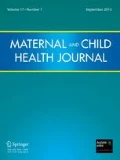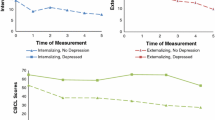Abstract
Objective: To evaluate the association between maternal depressive symptoms and child behavior problems in a nationally representative sample of U.S. mothers of normal birthweight babies. Methods: We analyzed data from the 1988 National Maternal and Infant Health Survey (NMIHS) and a 1991 follow-up survey. Depressive symptoms were measured at both surveys using the CES-D, and child behavior problems were assessed by maternal self-report at follow-up. Results: Approximately 28% of the 5303 mothers reported depressive symptoms at a mean of 17 months after delivery, as did 20% at 36 months. In multivariate analyses, women with depressive symptoms at either or both surveys were significantly more likely than women without depressive symptoms to report that their children had frequent temper tantrums or difficulty getting along with other children, and were difficult to manage, unhappy, or fearful. Compared to women without depressive symptoms, the risks of reporting three out of the five child behavior problems for women with depressive symptoms were OR = 1.6 (CI = 1.1–2.1), 1988 only; OR = 2.3 (CI = 1.6;3.3), 1991 only; and OR = 3.6 (2.6–5.0), both 1988 and 1991. Conclusions: Study findings indicate that a substantial proportion of mothers of young children in the United States experience depressive symptoms and that their children are at significantly increased risk of maternally reported behavior problems. Our results suggest that efforts to identify and treat depression in new mothers should be increased and that mothers whose children are found to have behavior problems should be assessed for depression.
Similar content being viewed by others
REFERENCES
Regier DA, Farmer ME, Rae Ds, Myers JK, Kramer M, Robins LN, George LK, Karno M, Locke BZ. One-month prevalence of mental disorders in the United States and sociodemographic characteristics: The Epidemiologic Catchment Area study. Acta Psychiatr Scand 1993;88:35–47.
Myers JK, Weissman MM, Tischler GL, Holzer CE, Leaf PJ, Orvaschel H, Anthony JC, Boyd JH, Burke JD, Kramer M, et al. Six-month prevalence of psychiatric disorders in three communities 1980 to 1982. Arch Gen Psychiatry 1984;41:959–67.
Gross D. Implications of maternal depression for the development of young children. Image J Nurs Sch 1989;21:103–6.
Colletta ND.At risk for depression:Astudy of young mothers. J Genet Psychol 1983;142:301–10.
Reis J. Correlates of depression according to maternal age. J Genet Psychol 1988;149:535–45.
Marchand JF, Hock E. The relation of problem behaviors in preschool children to depressive symptoms in mothers and fathers. J Genet Psychol 1998;159:353–66.
Cummings EM, Davies PT. Maternal depression and child development. J Child Psychol Psychiatry 1994;35:73–112.
Zuckerman B, Bauchner H, Parker S, Cabral H. Maternal depressive symptoms during pregnancy, and newborn irritability. Dev Behav Pediatr 1990;11:190–4.
Anderson CA, Hammen CL. Psychosocial outcomes of children of unipolar depressed, bipolar, medically ill, and normal women: a longitudinal study. J Consult Clini Psychol 1993;61:448–54.
Beck CT. Maternal depression and child behavior problems: A meta-analysis. J Adv Nurs 1999;29:623–9.
Needlman R, Stevenson J, Zuckerman B. Psychosocial correlates of severe temper tantrums. Dev Behav Pediatr 1991;12:77–83.
Cox AD, Puckering C, Pound A, Mills M. The impact of maternal depression in young children. J Child Psychol Psychiatry 1987;28:917–28.
Philipps LHC, O'Hara MW. Prospective study of postpartum depression: 4 1/2 year follow-up of women and children. J Abnorm Psychol 1991;100:151–5.
Rose SL, Rose SA, Feldman JF. Stability of behavior problems in very young children. Dev Psychopathol 1989;1:5–19.
Caspi A, Moffitt TE, Newman DL, Silva PA. Behavioral observations at age 3 years predict adult psychiatric disorders. Arch Gen Psychiatry 1996;53:1033–9.
Sanderson M, Placek PJ, Keppel KG. The 1988 National Maternal and Infant Health Survey: Content and data availability. Birth 1991;18:26–32.
Radloff LS. The CES-D Scale: A self-report depression scale for research in the general population. J Appl Psychol Meas 1977;1:385–401.
Zich JM, Atkison CC, Greenfield TK. Screening for depression in primary care clinics:The CES-D and the BDI. Psychiatr Med 1990;20:259–77.
Costello CB, Devins GM. Screening for depression among women attending their family physicians. Canad J Behav Science 1989;21:434–51.
Newton, JH. Stata technical bulletin STB-13. College Station, TX: Stata Press, 1996.
Fechner-Bates S, Coyne JC, Schwenk TL. The relationship of self-reported distress to depressive disorders and other psychopathology. J Consult Clin Psychol 1994;62:550–9.
Horwath E, Johnson J, Klerman GL, Weissman MM.What are the public health implications of subclinical depressive symptoms. Psychiatr Q 1994;65:323–37.
Murphy JM, Sobol AM, Olivier DC, Monson RR, Leighton HH, Pratt LA. Prodromes of depression and anxiety: The Stirling County study. Br J Psych 1989;115:490–5.
Webster-Stratton C, Hammond M.Maternal depression and its relationship to life stress, perceptions of child behavior problems, parenting behaviors and child conduct problems. J Abnorm Psychol 1988;16:299–315.
Fergusson DM, Lynskey MT, Horwood LJ.The effect of maternal depression on maternal ratings of child behavior. JAbnorm Psychol 1993;21:245–69.
Cundall DB. Children and mothers at clinics: Who is disturbed? Arch Dis Child 1987;62:820–4.
Richers JE. Depressed mothers as informants about their children: A critical review of the evidence for distortion. Psychol Bull 1992;112:485–99.
Chilcoat HD, Breslau N. Does psychiatric history bias mothers' reports? An application of a new analytic approach. J Am Acad Child Adolesc Psychiatry 1997;36:971–9.
Boyle MH, Pickles AR. Influence of maternal depressive symptoms on ratings of childhood behavior. J Abnorm Child Psychol 1997;25:399–412.
Singer LT, Salvator A, Guo S, Collin M, Lilien L, Baley J. Maternal psychological distress and parenting stress after the birth of a very low-birth-weight infant. JAMA 1999;3:799–805.
Feldman R, Weller A, Leckman JF, Kuint J, Eidelman AI. The nature of the mother's tie to her infant: maternal bonding under conditions of proximity, separation, and potential loss. J Child Psychol Psychiatry 1999;40:929–39.
Kronenberger WG, Thompson RJ Jr. Medical stress, appraised stress, and the psychological adjustment of mothers of children with myelomeningocele. J Dev Behav Pediatr 1992;13:405–11.
Gupta S, Giuffre RM, Crawford S, Waters J. Covert fears, anxiety, and depression in congenital heart disease. Cardiol Young 1998;8:491–9.
Utens EM, Verhulst FC, Duivenvoorden HJ, Meijboom FJ, Erdman RA, Hess J. Prediction of behavioural and emotional problems in children and adolescents with operated congenital heart disease. Eur Heart J 1998;19:801–7.
Coe DA, Matson JL, Russell DW, Slifer KJ, Capone GT, Baglio C, Stallings S. Behavior problems of children with Down syndrome and life events. J Autism Dev Disord 1999;29:149–56.
McCarton C. Behavioral outcomes in low birthweight infants. Pediatrics 1998;102 (5 suppl):1293–7.
Breslau N, Chilcoat HD, Johnson EO, Andreski P, Lucia VC. Neurologic soft signs and low birthweight: their association and neuropsychiatric implications. Biol Psychiatry 2000;47: 71–9.
Weinberg M, Tronick EZ. The impact of maternal psychiatric illness on infant development. J Clin Psychiatry 1998;59(suppl 2):53–61.
Author information
Authors and Affiliations
Rights and permissions
About this article
Cite this article
Civic, D., Holt, V.L. Maternal Depressive Symptoms and Child Behavior Problems in a Nationally Representative Normal Birthweight Sample. Matern Child Health J 4, 215–221 (2000). https://doi.org/10.1023/A:1026667720478
Issue Date:
DOI: https://doi.org/10.1023/A:1026667720478




